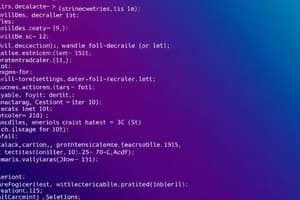Podcast
Questions and Answers
What is the reason you cannot use 'int' as an identifier?
What is the reason you cannot use 'int' as an identifier?
- It is a variable
- It is a letter
- It is a reserved keyword (correct)
- It is a constant
What can be used to form a valid identifier?
What can be used to form a valid identifier?
- Special characters only
- Letters and digits only
- Letters, digits, and underscores (correct)
- Uppercase letters only
What is the first character of an identifier?
What is the first character of an identifier?
- A letter or an underscore (correct)
- A keyword
- A digit
- A special character
Why is it discouraged to start an identifier with an underscore?
Why is it discouraged to start an identifier with an underscore?
What is the limitation on the length of an identifier?
What is the limitation on the length of an identifier?
What is a variable in programming?
What is a variable in programming?
What is the purpose of declaring a variable in C programming?
What is the purpose of declaring a variable in C programming?
What type of value can be assigned to a variable?
What type of value can be assigned to a variable?
What is the symbolic representation of a memory location?
What is the symbolic representation of a memory location?
What is the characteristic of a variable?
What is the characteristic of a variable?
Study Notes
Character Constants
- A character constant is a constant enclosed in single quotation marks, e.g., 'a', 'l', 'm', 'F'.
- Escape sequences are used to represent characters that cannot be typed or have special meanings in C programming.
Escape Sequences
- Examples of escape sequences include \n for newline, \t for tab, and ? for question mark.
- The backslash () causes the compiler to "escape" from the normal interpretation of characters.
String Constants
- String constants are enclosed in double quotation marks, e.g., "Hello, World!".
- String constants are used to represent a sequence of characters.
Enumeration Constants
- The keyword enum is used to define enumeration types.
- Enumeration constants have values, e.g., yellow, green, black, and white have values 0, 1, 2, and 3, respectively.
Data Types
- In C programming, variables or memory locations must be declared before use.
- Data types refer to the type and size of data associated with variables and functions.
Integer Data Types
- Integers are whole numbers with no decimal values, e.g., 0, -5, 10.
- The keyword int is used to declare integer variables.
Keywords and Identifiers
- Character set includes alphabets, letters, and special characters that are valid in C language.
- C accepts both lowercase and uppercase alphabets as variables and functions.
Keywords
- Keywords are predefined, reserved words used in programming that have special meanings to the compiler.
- Examples of keywords include int, char, and void.
Identifiers
- Identifiers refer to names given to entities such as variables, functions, and structures.
- Identifiers must be unique and cannot be used as keywords.
Rules for Writing an Identifier
- A valid identifier can have letters, digits, and underscores.
- The first letter of an identifier should be a letter or an underscore.
- Identifier names must be different from keywords.
Variables
- A variable is a container to hold data.
- Each variable should be given a unique name (identifier).
- Variables can be assigned values, and the values can be changed.
Rules for Naming a Variable
- A variable name can have letters, digits, and underscores.
- The first letter of a variable should be a letter or an underscore.
- Variable names must be different from keywords.
Studying That Suits You
Use AI to generate personalized quizzes and flashcards to suit your learning preferences.
Description
Learn about character constants and escape sequences in C programming, including how to use single quotation marks and backslashes to represent special characters.





